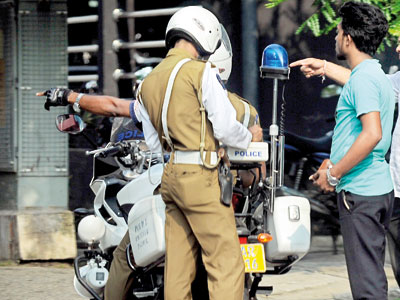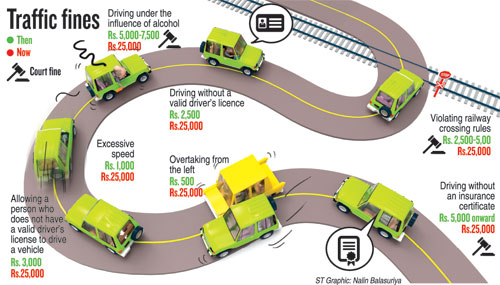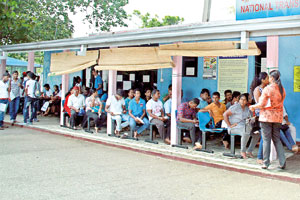News
Rs. 25,000 fines aimed at heart of accidents crisis, Govt says

Caught: An alleged traffic offender being given a ticket/ Pic by Amila Gamage
Hard on the heels of a steep increase in fines for seven major traffic offences will come more penalties for errant drivers and motorcycle riders shortly with the decision to further revise fines for traffic offences and expedite implementation of a licence demerit system.
Discussions among officials of the Transport, Justice and Finance Ministry and the police, Road Safety Authority, Transport Commission and the Motor Traffic Department were underway this week on new fines and increases of other penalties.
A minimum Rs 25,000 fine will be imposed on seven offences – speeding, drink-driving, driving without a licence, driving without vehicle insurance, overtaking from the left, allowing someone to drive without a driving licence and driving illegally through a railway crossing.
It is learned that an increase in the minimum fine for other traffic offences to Rs. 500 or more is being discussed. Currently, the lowest fine is Rs 20 while at least eight other offences incur fines of Rs.100-150.
Initially, Finance Minister Ravi Karunayake announced in his Budget speech that the minimum fine for all traffic offences was being increased to Rs 2,500, but following discussions with private bus owners’ associations and other sectors it was decided that fines for seven offences only would be increased for the time being and that the minimum fine for these offences would be increased to Rs 25,000.
There are mixed reactions from vehicle owners, drivers, pedestrians, private bus owner associations, three-wheeler associations, heavy vehicle drivers and school van drivers’ associations over the Rs. 25,000 proposal.
Most believe steps should be taken to reduce the increase in accidents and support an increase in fines but fear that the steep increase would hit many who cannot afford a Rs 25,000 fine.
The authorities, however, defended the planned increases as statistics show the offences applicable to the Rs. 25,000 fine are the main causes for most serious and fatal accidents.
In 2014, of a total of 37,345 accidents, 30,166 were caused by aggressive or negligent driving while another 4,418 were caused by speeding and 1,796 caused by drivers under the influence of liquor or drugs.

During the same year, 1,870 of the 2,429 recorded fatal accidents were caused by aggressive and negligent driving while 326 deaths resulted from speeding. Another 147 deaths occurred as a result of drink-driving.
“It is only when people are forced to pay heavy fines or face harsh punishment they will know the gravity of the offence committed. Otherwise they tend to repeat the offence,” National Council for Road Safety (NCRS) Chairman Dr Sisira Kodagoda said.
“Our findings are that the highest number of fatalities occurred through speeding, drinking and negligent driving. The objective is to discipline the drivers and reduce accidents through strict rules.”
Dr Kodagoda hopes the new system of fines would be finalised next week.
He said that all private transport providers and the public sector had to follow the law as the objective was to reduce fatalities.
“A driver who is speeding or consumed liquor can cause a serious accident. Therefore they should be discouraged with a fine and legal action should be taken reflecting the loss, inconvenience and the gravity of their action,” he said.
The Director of Colombo Traffic division, Superintendent Sumith Nissanka, said that fines should have been increased much earlier.
He said that some spot fines for offences such as reversing onto a main road and failure to take precautions while pumping fuel were only Rs 20 and needed revision.
“Issuing documents and maintaining files for small fines are more costly than the fine itself,” Superintendent Nissanka said.
He believes the increase in the fine for overtaking from the left should be reconsidered as there were practical difficulties in implementing it in some areas.
“Fines are important to stop wrong behaviour. If no one commits offences there will be no fines and therefore no one need protest,” he said.
CCTV cameras would be installed to detect traffic offences while new speed meter machines that can photograph a speeding vehicle’s number plate and offender’s image would be used to avoid disputes over such detections. A printout of the images would be provided along with the recorded speed of the vehicle.
Associations representing the private bus sector, three-wheelers, motorbike riders, heavy vehicles and school van drivers’ unions said would support an increase in fines but Rs. 25,000 was too high.
The Chairman of the Inter-Provincial Bus Owners Association, Sarath Wijeratna Kumara, said he still did not know whether the increases were for spot fines or court fines.
Imposing a large fine on drivers who lack licences or who drive dangerously was good but the amount should be around Rs.10,000 as drivers could not afford to pay Rs 25,000, he said, and called for requisite improvements in roads, traffic lanes and parking places.
“The government can lay down the rules if they can provide us roads and lanes for the buses. Otherwise it is only inconvenience to the drivers,” Mr. Kumara said.
He said that if government wanted to reduce bad driving the demerit system could be activated and licences impounded.
Southern Private Bus Owners Association Chairman Chandana de Zoysa also said bus drivers would find it difficult to pay 25,000 and feared they would be imprisoned if unable to pay the fine.
All-Island Three-Wheel Drivers’ Union President Lalith Dharmasekara said it was impractical to increase the minimum fine to Rs. 25,000.
“More accidents happen when people try to overtake on a bend or cross multiple lanes yet the fine remains the same for these offences,” he said.
All-Island Inter-District Schoolchildren’s Transport Association President N.M.K. Harishchandra Padmasiri said the new fines could affect drivers who had to make an emergency stop to tend to an emergency regarding a child passenger.
His organisation plans to challenge the fines in courts in addition to going to the Human Rights Commission.
Senior Lecturer in Economics at the University of Colombo, Lalithasiri Gunaruwan, said the demerits system should have been considered without depending on an increase in fines to reduce accidents.
The decision to revise fines should have been based on research into the relevant issues, he added.
“One of the issues to be considered is the income of the drivers and their expenditure. A sample survey should have been done to study the impact and thereafter a trial should have been carried out,” Mr. Gunaruwan said.
Mr. Gunaruwan claimed the new fines system could have an adverse impact on the economy with the anticipated slowing down of traffic due to drivers taking precautions. “Heavy vehicles carrying goods for exports will be delayed and public and private transport will be slowed down,” he said.
Rush to get medical clearance at NTMI  Waiting to get their medicals done. Pic by Indika Handuwala Hundreds, mostly youth, are flocking to the National Transport Medical Institute (NTMI) in Nugegoda daily to obtain a medical certificate, a requirement to get a driving licence. NTMI Chairman Dr. Rohona Pushpakumara said they have been getting over 700 applications a day to get medical clearance after the Government announced that heavy fines would be imposed for driving without licences. Previously they received around 400 a day. He said many of the applicants were young trishaw drivers and those who drove heavy vehicles with light vehicle licences. Dr. Pushpakumara said among the applicants were those who feared that licences would not be issued to those below 25 years of age. In the recent Budget the Government put forward a proposal that the minimum age to drive a three wheeler should be 25 years. |
| Tough penalties worldwide to prevent accidentsMost countries have tough penalties against those found guilty of drunken driving or speeding to keep down the number of accidents and casualties. In India, a person arrested for drink-driving will be fined from (Indian) Rs 2,000 (SLRS 4,335) to Rs 10,000 and can be imprisoned for a period ranging from six month to four years. The penalties are assessed depending on the alcohol content in the blood and the level of loss created by the drunk driver. Speed-check cameras erected on national highways in India capture images of speeding vehicles and a notice of demand is sent to the driver’s address with a photo of the speeding vehicle, the speed recorded, the legal speed limit and the amount of the fine levied for the offence. The driver can pay the fine online. In case of failure of payment within a due date a court summons is issued. Speeding and reckless driving attract fines of up to Indian Rs. 2,000 and a possible six-month jail term. Many of these laws are not, however, implemented effectively. In countries such as the United States and the United Arab Emirates, strict traffic laws and controls on issuing drivers’ licences are effective in curbing accidents. Drink-driving is a criminal offence in the US and it is the same in countries such as Canada and Australia. In Australia, for speeding, a licence can be suspended for up to one month and the driver fined more than $A500, which is more than Rs 50,000. In the UAE, a driver arrested for drink-driving must face court and it is the court decision that prevails. Also, the vehicle will be confiscated for a period of two months. For reckless driving, the fines can extend to 2000 UAE Dinar, more than Rs 80,000. An interesting bit of trivia related to traffic penalties comes from Thailand, where a person arrested for drink-driving is sent to work in a morgue – a measure introduced this year. It is not known how strictly this action is implemented. |

